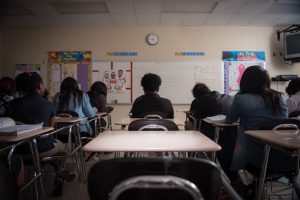Educators address classroom behaviors while avoiding student removals from learning environments.
By David Miller
Photos by Bryan Hester and Zach Riggins

A teacher refers a student to the principal’s office for disrespectful behavior toward classmates and disrupting instruction. It’s not the student’s first referral.
The student’s behavior is increasingly negative. Discipline options are limited: in-school suspension, detention or out-of-school suspension.
In another classroom at a different school, a teacher uses a unique, proactive system to stem the problem behavior. Instead of issuing out-of-class referrals, the teacher employs positive reinforcement to achieve the desired results: a reduction in problem behavior and an increase in the student’s academic performance.
Too often, schools rely on punishment-based systems that, while effective in short-term situations, do not address deep-rooted issues and sacrifice long-term achievement because students are pulled from the classroom, says Dr. Sara McDaniel, a University of Alabama education professor who directs the Alabama Positive Behavior Support Office.
McDaniel and the Office are working with Birmingham and Huntsville city schools to implement the Positive Behavior Interventions and Supports framework, a model established by the U.S. Department of Education’s Office of Special Education Programs. The effort defines, develops, implements and evaluates a multi-tiered approach to helping schools. The goal is to positively impact emotional, social and academic outcomes for all students.
The PBIS model contains three tiers, the first is a catch-all system to teach and reinforce positive behavior for all students. The second and third tiers include specific interventions for students who exhibit increasingly severe problem behavior.
McDaniel and her team of graduate student researchers, the project coordinator, and Dr. Wes Sims, a UA education colleague, are training and coaching faculty and staff in Birmingham and Huntsville to design and manage their own Tier 1 frameworks.
“The goal is to be very clear and open with those students about what we want to see, and be consistent across the building, so students can understand and meet the expectations of adults in the building,” McDaniel says. “There are also components of school safety and climate, but, at its core, it’s an evidenced-based framework that is responsive to student needs.”

The first requirement for McDaniel and her researchers is buy-in from administrators and teachers. Developing the framework and standards requires consistency on both ends. Training requires a year-long commitment to reinforcing standards and expectations that are customized by the teachers, based on grade, school climate and existing behavioral issues.
McDaniel’s team conducts two days of initial training for teachers and provides a customizable template for school officials. They return once a month to analyze the school’s data and structure their meetings. McDaniel’s team also troubleshoots remotely.
“Initially, many teachers think PBIS is ‘the three Rs’ – be respectful, responsible and resourceful,” McDaniel says. “A lot of our focus is undoing that prior knowledge and establishing a brand new framework for each school, which sets individualized expectations. Then, we figure out how to teach those, design a reinforcement system, and spend the latter part looking at their behavioral data – office referrals, suspensions, removals, expulsions.”
Maria Lyas-Young, PBIS coordinator for Birmingham City Schools, is tasked with supervising district-wide initiatives, tracking behaviors and consequences each quarter.
She says superintendent Dr. Kelley Castlin-Gacutan’s strategic plan includes district-wide implementation of the PBIS, with an immediate focus of helping address disciplinary rates in 16 targeted schools, which may contribute to low student achievement rates.
Several schools in the district had previously experimented with PBIS frameworks, but no consistency with monitoring was in place, Lyas-Young says.
“Traditionally, PBIS begins the preceding school year, but because we were trying to tackle this with a vengeance, Dr. McDaniel came in with her group to do a training in October (2015), which is unconventional timing,” Lyas-Young says.

“Several schools had a high rate of infractions, and we wanted to change the culture of those schools before spring testing 2016. Due to the latency of training, initial challenges were present, but, I will say this, once principals understood the model, when Sarah came in and did the two-day training, once we got through the initial bumps, schools really took it by the horns showing significant improvements in school culture and reductions in incidents like disrespect, fighting and not following the rules.
“It was a galvanizing moment for those schools.”
McDaniel and her team are training its second Birmingham City Schools cohort, a group she’s eager to work with following the initial success. A key component of that success was fidelity at all levels of the district, she says. While it typically takes three to five years to see longer-term effects, if an entire school and district is invested in PBIS, officials can begin seeing immediate changes in attendance and achievement, she says.
“If it were easy, everyone would already be doing it,” McDaniel says. “I always compare it to pre-K, where school readiness can prevent problems in the school year. With Pre-K, an up- front investment, educators seek improved trajectories.
“This is the same investment in spending time to develop the framework and analyze the data.”

McDaniel and her team will later train teachers and administrators in both systems to implement Tier 2 of the PBIS frameworks, which is targeted for children with specific behavior problems.
The Association for Positive Behavior Support selected McDaniel for the 2016 E.G. “Ted” Carr Initial Researcher Award for her Tier-2 research. She is conducting a collaborative study with UA psychology professors Drs. John Lochman, Caroline Boxmeyer, and Nicole Powell to incorporate Lochman’s “Coping Power” curriculum into school interventions in Martin Luther King, Jr. Elementary School in Tuscaloosa.
“Early in my teaching career, I saw kids who were being skipped over getting that extra support before they were referred to special education,” McDaniel says. “The consequences of that, for students, are very dangerous.
“Instead of providing extra support, schools were using more suspension. What students are telling us through their disruptive behavior is that they need extra help, instruction and better relationships in their school. It really interested me as a young educator to figure out the most effective and feasible ways to intervene at Tier 2.”
Dr. McDaniel is an associate professor of special education, and Dr. Wes Sims is a clinical assistant professor, both in UA’s College of Education.
